Environmental organisation Milieudefensie have calculated that every second, around 169 trees are cut down in tropical rainforests.
So the race is on to find a real solution to stop this! Right now, several new technologies are furiously competing with each other to create a healthier, lab-created alternatives to palm oil. Palm oil has been historically grown in the ashes of dead rainforests and consumers DO NOT WANT to be part of that anymore.
Sadly, a multitude of reports from the media and whistle-blowing organisations show how “sustainable” palm oil is a greenwashing lie.
Unlike #greenwashing promises of the @RSPOtweets to stop #deforestation for palm oil – novel solutions made in labs will actually deliver deforestation-free #palmoil alternatives. Should we be cautiously hopeful? Yes! #Boycott4Wildlife
Tweet
If u want reason to hope, here are synthetic #palmoil alternatives. These will be 100% free of #deforestation – for real! Made from #algae #yeast #microbes, even CO2! Advocate for deforestation-free #palmoil alternatives #Boycottpalmoil #Boycott4Wildlife
Tweet
New synthetic #palmoil alternatives generated labs will actually be free of #deforestation! Made from #algae #yeast #microbes and even CO2. True deforestation-free #palmoil alternatives are here. The #Boycott4Wildlife supports this!
Tweet
Lab-grown alternatives to palm oil provide animal advocates and environmental activists with reasons to be cautiously hopeful for the future of mass-produced supermarket goods like cleaning products, pet food, beauty products, and food – 50% of which contain palm oil.

What can I do?
Until these palm oil free alternatives come onto the market and are used in consumer products, you can help these animals by rejecting the immense corruption, pollution and ecocide of the palm oil industry by boycotting major supermarket brands using palm oil and still benefiting from the greenwashing of “sustainable” palm oil. Here are tips on how to do that.
Clean Food Group
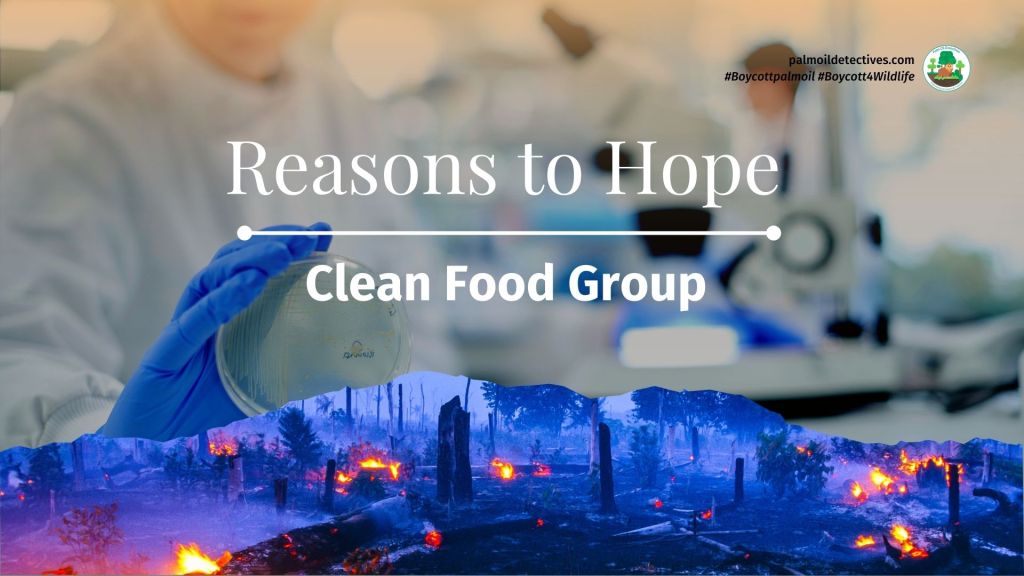
What is it?
UK based start-up producing a local, circular alternative to palm oil, made from natural yeast using a non-GM process in a lab.
Who is behind it?
The Clean Food Group was co-founded by CEO Alex Neves and co-chairman Ed McDermott in 2021. However, the foundational technology was developed over eight years at the University of Bath by Professor of Bioengineering the University of Bath, Chris Chuck. They have so far gained £1.65M in funding.
Goal/Objective:
To make clean, healthier palm oil derivatives that can be used within food or cosmetic formulations. These provide a clear alternative to palm oil grown in the traditional way which causes irrevocable damage to our planet and health.
When will it be used in supermarket goods?
There is no date given, but market launch sounds like it is imminent.
“We are well placed to take the next step on the path of bringing our palm oil alternative to market.
Alex Neves, Co-Founder and CEO of Clean Food Group, EU startups
“Our dependence on palm oil comes at a great environmental cost. We’ve worked over many years to create robust palm oil alternatives that give us a real chance to cut the impact of a range of products. Up until now it has only been possible to produce these products with palm oil and the deforestation, emissions and pollution that comes with that”
Chris Chuck, Clean Food Group Technical Advisor and Professor of Bioprocess Engineering at the University of Bath.
Find out more:
Bath & Somerset Business Exchange
NoPalm
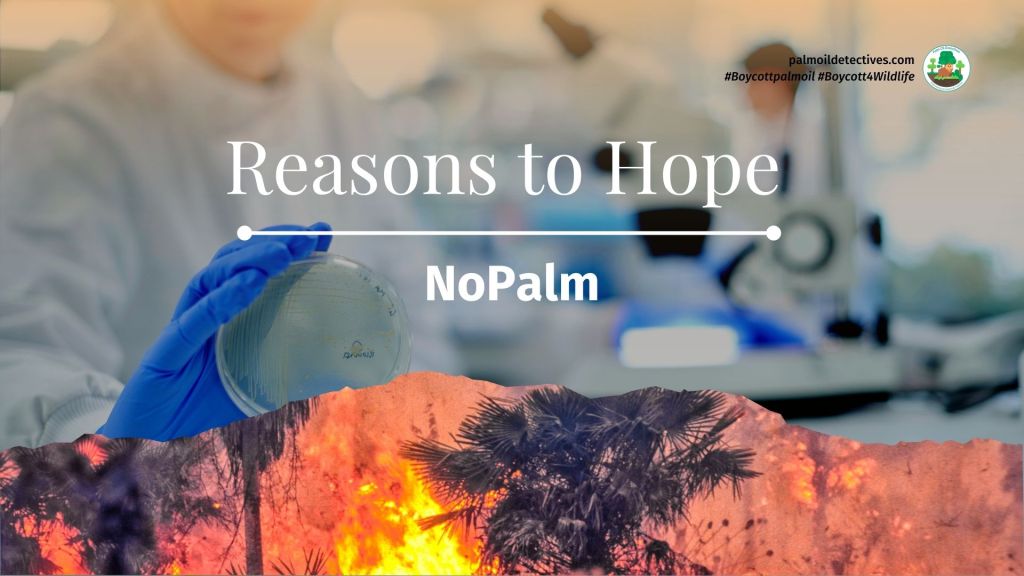
What is it?
NoPalm produces microbial oils to replace the use of palm- and other tropical oils in food, cosmetics, and detergents. The oil is manufactured by fermenting food waste in a circular, environmentally friendly way.
Who is behind it?
A start-up in the Netherlands founded by Lars Langhout and Jeroen Hugenholtz in 2021.
Goal/Objective:
That no forests anywhere in the world continue to be burned down for palm oil plantations.
How is it made?
Oil is produced from rejected vegetables, potato peels or sugar beets that are fermented with oleaginous yeasts. Whereas normally these waste products would be destroyed or thrown away, NoPalm gives waste biomass a second life. The process is similar to brewing beer or winemaking except for the type of yeast used.
“There is no argument as to why palm oil plantations should continue to run in the long-term. We have a solution that’s local, which can leverage local supply chains to produce it, doesn’t require deforestation or transportation to produce it and limits the use of chemicals. Imagine if all companies in the world started using microbial oil instead of palm oil. We could make a real impact and eliminate palm oil in an accelerated way.”
When will it be used in supermarket goods?
The team have received initial funding of 1.5 million euro and are looking for more. They anticipate the ingredient will be available in consumer goods within the next few years.
Find out more: Innovation Origins
GreenOn

What is it?
GreenOn is a biotech company producing oils and derivatives that can be used to replace palm oil, coconut oil and animal fats, powered by carbon dioxide, electricity and water.
Who is behind it?
GreenOn is a Swedish biotech start-up founded in 2021 by Annette Cecilia Granéli and Roland Vestergren. Initial funding for the technology comes from palm oil polluter and deforestator (and RSPO member) AAK for their go-to-market commercialisation, they have invested $125K so far.
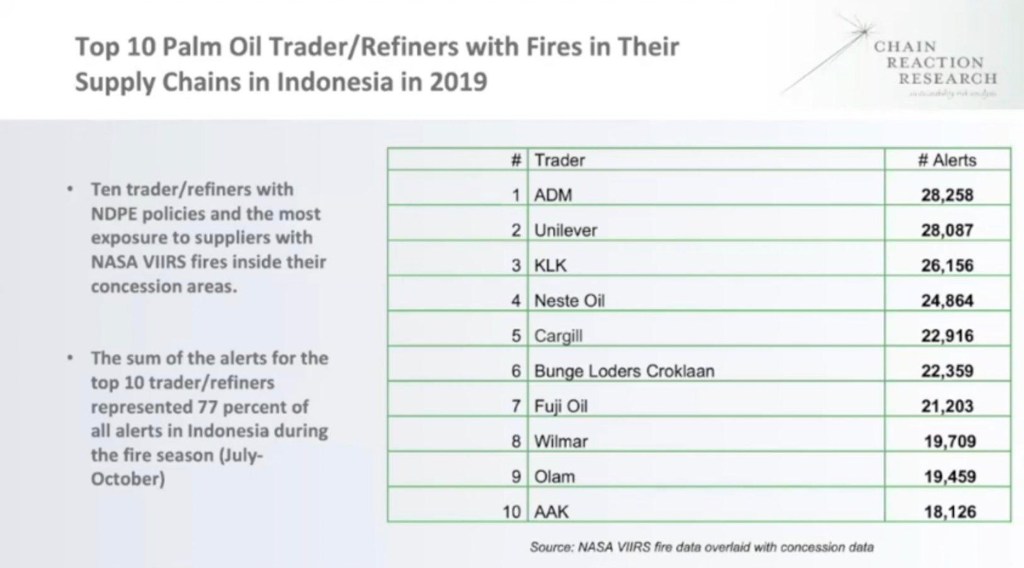
Goal/Objective:
“We hope our product technology can relieve the challenges of agricultural production on the environment.”
GREEN ON’S WEBSITE
How is it made?
Their novel ‘Power-to-Food’ concept uses fossil-free electricity, carbon dioxide and water to produce customised saturated fats that can be used in products such as baked foods, cheese, ice cream, chocolate and shortening. Green-On also makes mono and diglycerides that may be used as emulsifiers in food products.
When will it be used in supermarket goods?
Products are still being developed, however it’s estimated that product ingredients to replace palm oil will be ready at the earliest by 2024.
“We came up with a concept to produce food that bypasses traditional agriculture. We started Green-On to bring deforestation-free ingredients to the food and feed industry.”
GreenOn’s website
Find out more: GreenOn
C16 Biosciences
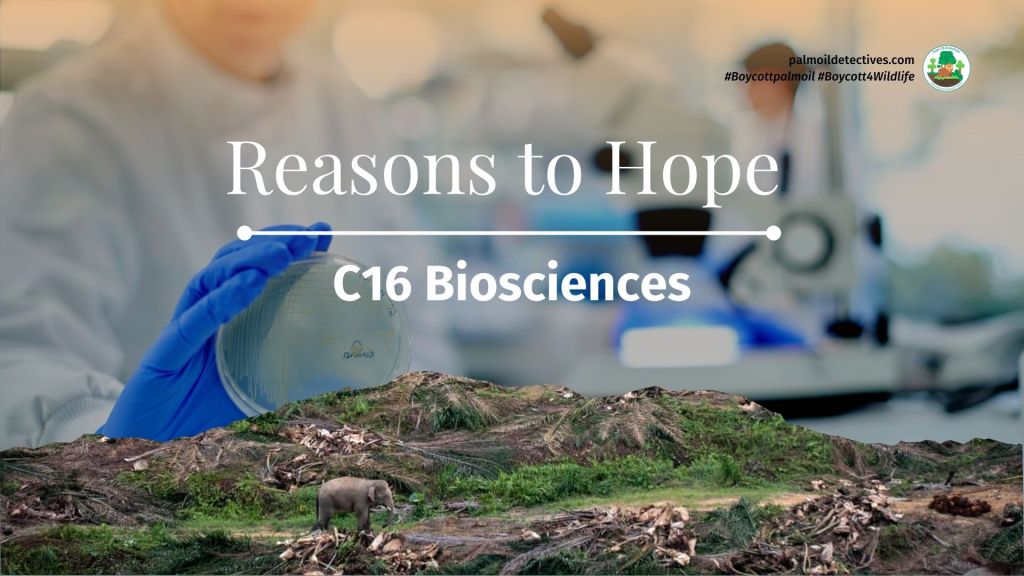
What is it?
“Our palm oil doesn’t even involve palm trees. It doesn’t cause deforestation, endangering precious animal species, or forcing inhumane labor practices. The result is a world where consumers can enjoy the products they love without worrying about the dangerous practices involved in making them.”
C16 Biosciences website.
Who is behind it?
C16 Biosciences are a New York City based start-up that are female-founded, and have a majority female team. Established in 2017, they have received $20 million in funding from Breakthrough Energy Ventures, a fund established by Bill Gates along with other investors to support innovations that fight climate change.
Goal/Objective:
“The RSPO has been trying for the last decade to solve this problem of palm oil deforestation through supply chain traceability, and it has largely failed.
“Our real mission is ending the need for deforestation that’s driven by the palm oil industry. We believe that it is totally unacceptable to be burning the planet to make a vegetable oil. It just doesn’t make any sense.”
Shara Ticku, Co-founder and CEO of C16 Biosciences told Fast Company.
How is it made?
C16 Biosciences use a particular strain of yeast for their lab-grown alternative to palm oil. This grows in tap water and feeds off a feedstock or carbon source to multiply.
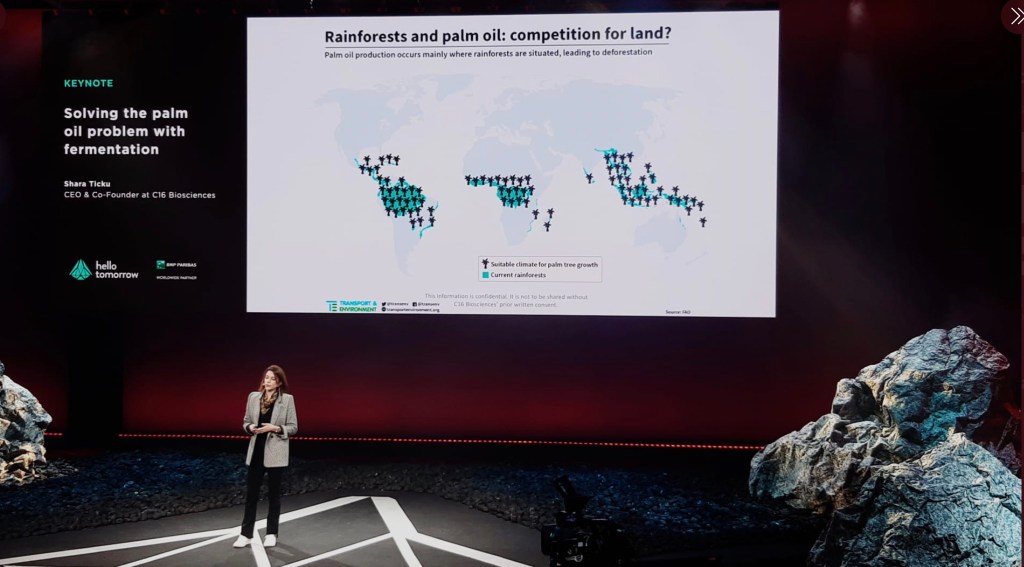
When will it be used in supermarket goods?
There is no date given, but market launch sounds like could be within the coming 2-3 years.
Find out more: C16 Biosciences
Untitled: Making Palm Oil From Algae
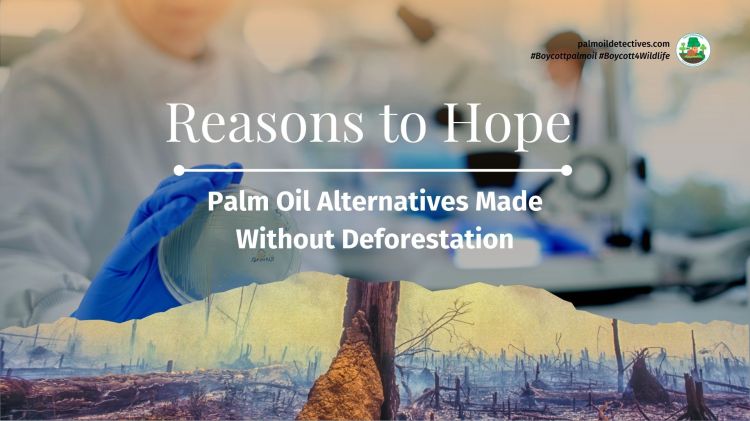
What is it?
A far healthier edible oil alternative created from microalgae.
Who is behind it?
Scientists from Nanyang Technological University in Singapore and the University of Malaya in Malaysia.
Goal/Objective:
“Uncovering microalgae as a potential human food source is an opportunity to lessen the impact of palm oil in the food supply chain and the impact this has on our planet.”
~ Dr William Chen, head of the research team and Director of NTU’s Food Science and Technology Program.
How is it made?
Edible oils are extracted from a common strain of microalgae that has similar properties to palm oil, however contains fewer saturated fatty acids. This means that the algae alternative will be healthier than traditionally harvested palm oil. Saturated fats from palm oil raise levels of LDL cholesterol in our blood, thereby increasing the risk of heart disease.
When will it be used in supermarket goods?
This microalgae alternative to palm oil can be cultivated at scale, removing the need for further deforestation to plant yet more oil palm crops. They are a couple of years away from market.
“We rely on one of nature’s key processes, fermentation, to convert that organic matter into nutrient-rich solutions, which could be used to cultivate algae, which not only reduces our reliance on palm oil, but keeps carbon out of the atmosphere.”
~ Dr William Chen, head of the research team and Director of NTU’s Food Science and Technology Program.
Find out more:
Jun-Hui Chen et al, Screening and effect evaluation of chemical inducers for enhancing astaxanthin and lipid production in mixotrophic Chromochloris zofingiensis, Journal of Applied Phycology (2021). DOI: 10.1007/s10811-021-02618-6
Genomatica

What is it?
A joint project between biotech company Genomatica and global FMCG brand Unilever to create a fatty alcohol alternative to palm oil made from fermented sugar. This would be used in skincare and beauty products.
Who is behind it?
This project is controversial for environmental activists and animal advocates to support. It is a collaboration funded by Unilever for $120 million. Unilever are a global corporate with a bad historical reputation as polluters and deforesters. They are linked to a dark history of colonial atrocities, ecocide and slavery in Africa. Still, despite Unilever’s involvement – this project deserves a mention due to its innovation. In October 2022, Kao announced that they will also be a founding partner in this biotech venture.
Goal/Objective:
The venture aims to commercialise and scale plant-based alternatives to feedstocks like palm oil and fossil fuels. Replacing environmentally harmful ingredients like palm oil with alternatives for use in cleaning, cosmetics and personal care products.
Beyond creating new transparent and responsibly sourced-supply chains and alternatively-sourced materials, our Geno technology also represents the potential to reduce greenhouse gas emissions by 100 million tons in upcoming years.”
Christophe Schilling, Genomatica CEO
When will it be used in supermarket goods?
There is no date given, but market launch sounds like could be within the coming 3-5 years.
Find out more: Genomatica

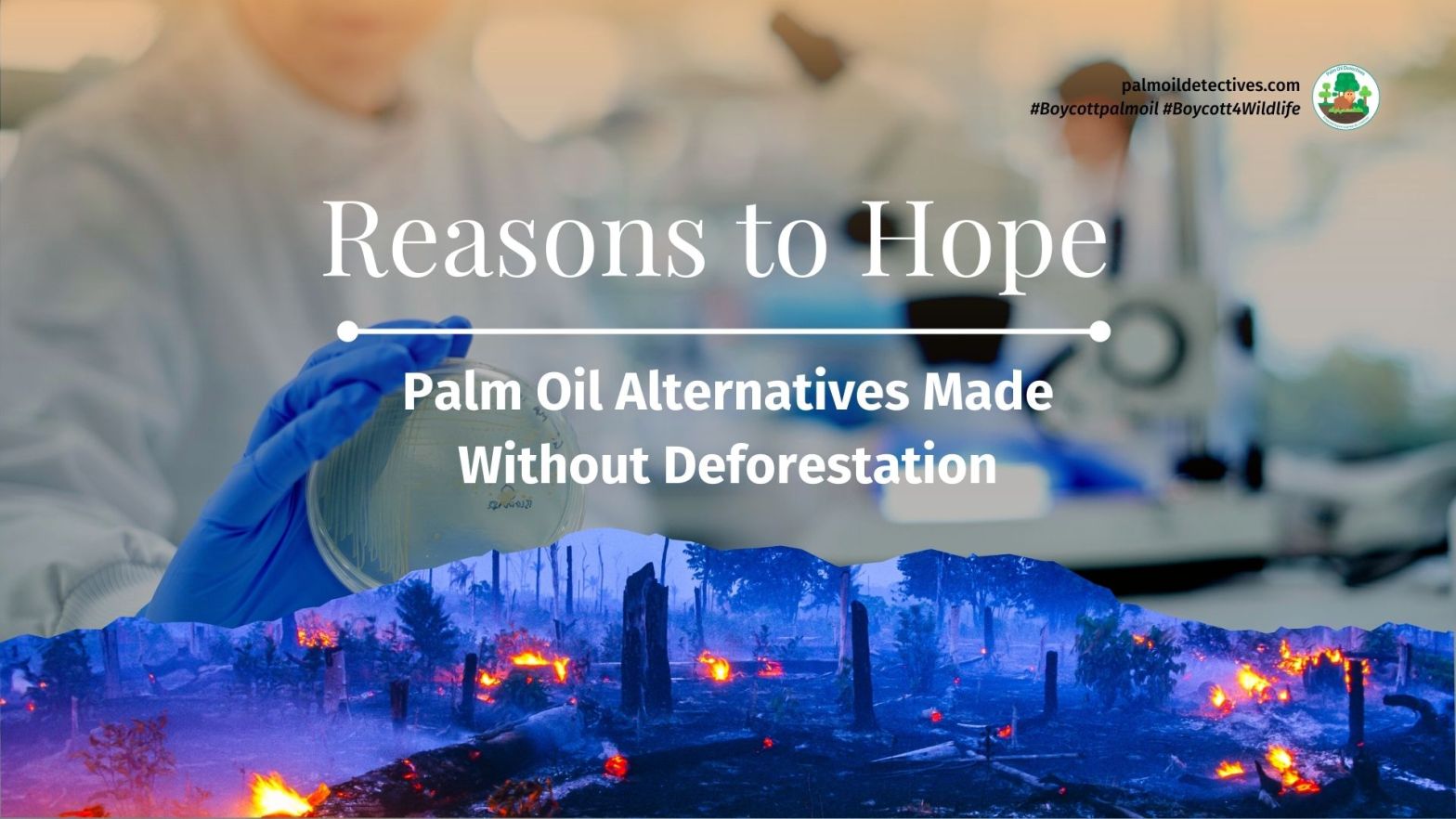
Very good post. Keep up the great work.
LikeLiked by 1 person
Thank you so much Ravi for your support
LikeLike